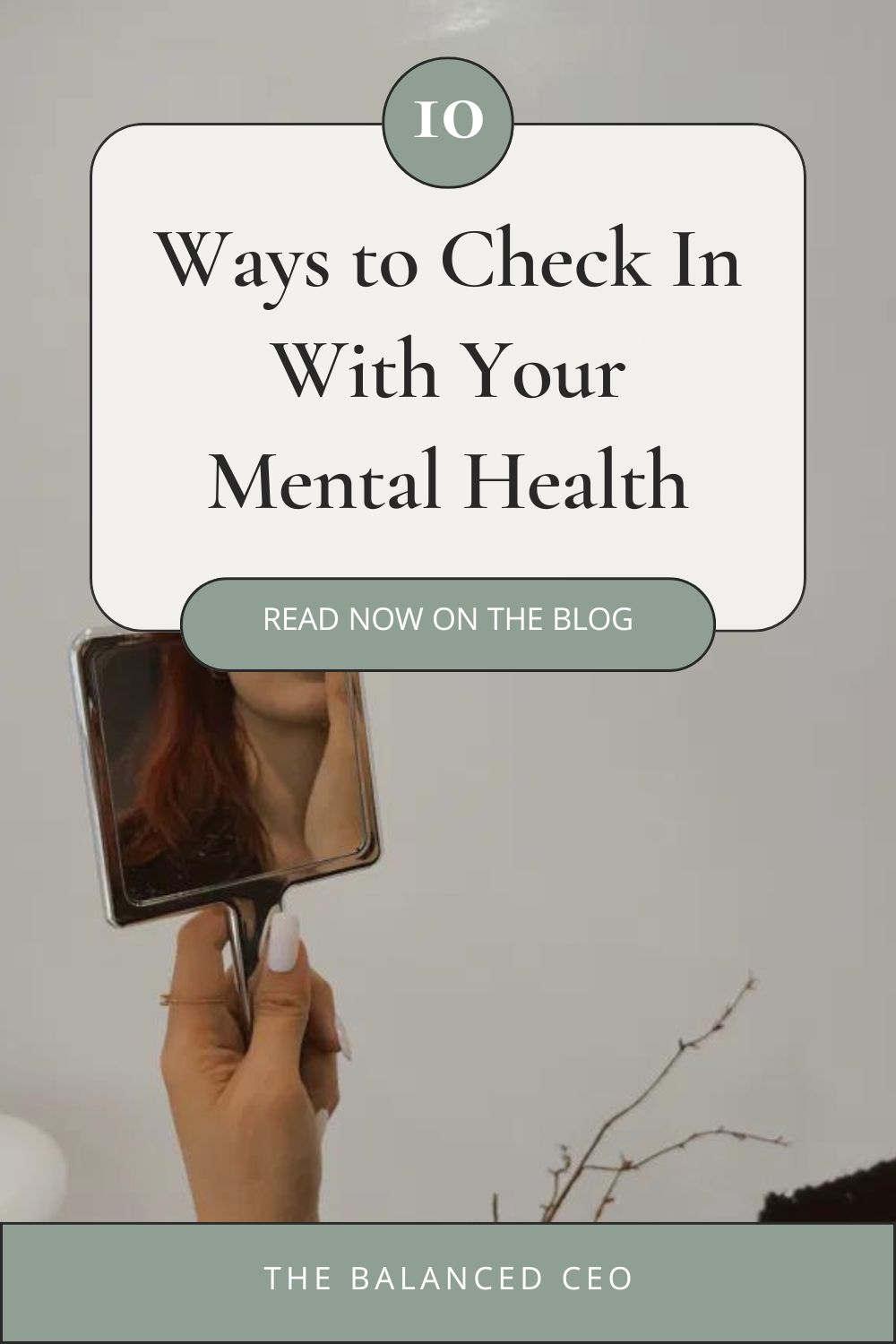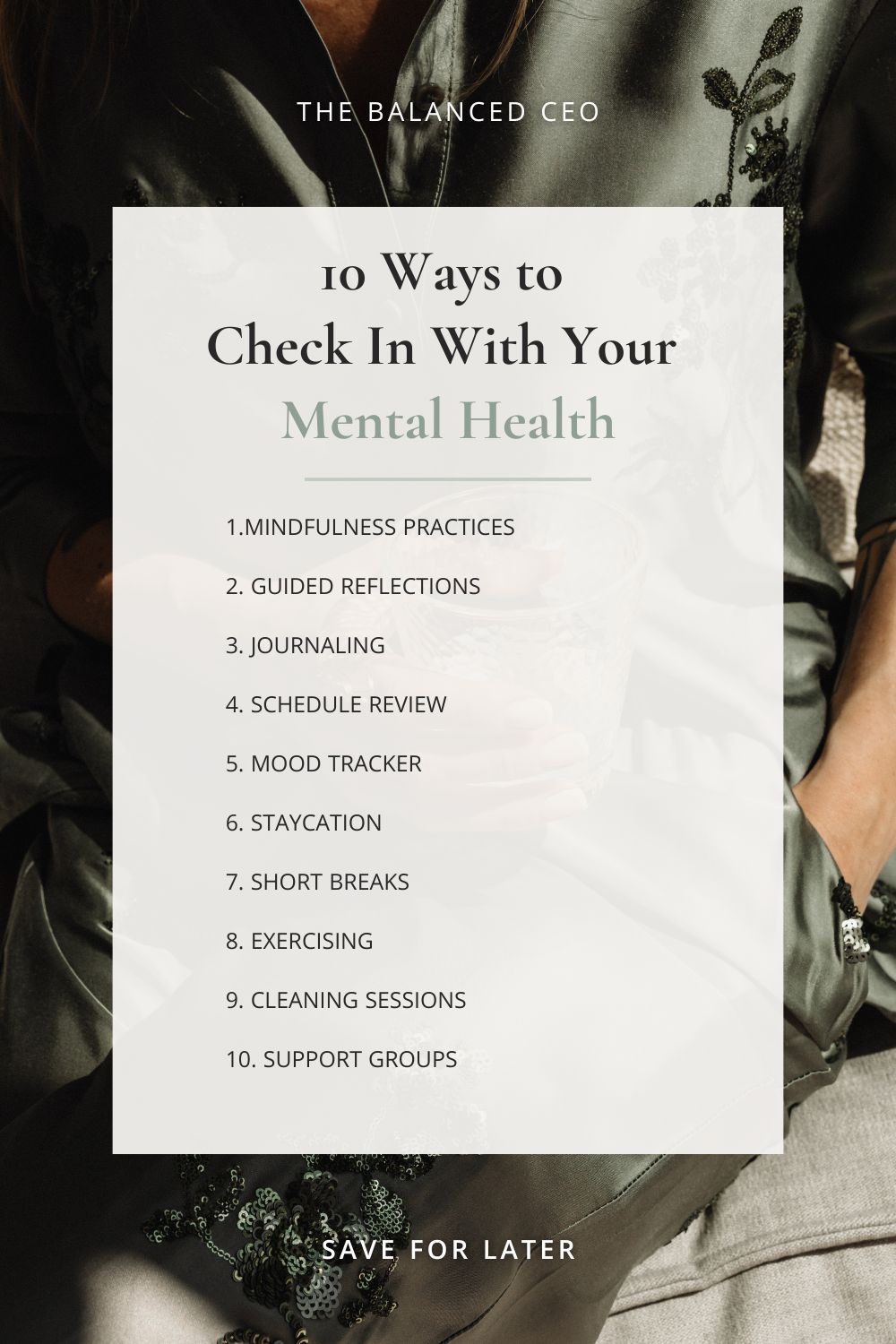This post may contain affiliate links, which means I’ll receive a commission if you purchase through my links, at no extra cost to you. Please read full disclosure for more information.

Life moves unbelievably fast. You may do your best to keep up, but it can all get overwhelming at times. Whether dealing with schoolwork, trying to complete a work project or facing a personal life crisis, your mental health is hit with a lot. Most people can cope with and navigate these challenges effectively, but that doesn’t mean emotions go unscathed.
People must pause and consider their situation. Regular mental health check-ins are critical for reevaluating your state of mind. They are an opportunity to intervene before you burn out.
Checking in with your mental health can be as simple as self-talk. Introspective queries like “how am I feeling today?” or “do I have lingering regret or guilt about something?” can bring out your true emotions. You can also combine this with other avenues.
1. Mindfulness Practices
Mindfulness is a vital practice of present-moment awareness. While it applies to connecting with what’s going on with your surroundings, it is much more focused on your internal state and surroundings. Use different exercises to assess your thoughts and emotions.
For example, focus on meditation. Sit somewhere comfortable and quiet, close your eyes, and breathe deeply. Allow your mind to wander before zoning in on more specific feelings to understand and manage them.
Being alone with your thoughts may be challenging, so try different tools to help. For example, about 63% of American app users are aware of mindfulness and meditation apps, with 20% using them during the third quarter of 2022.
2. Guided Reflections
A guided reflection can provide profound insights into your psyche. Two people are needed — one to ask questions and another to contemplate them.
Guided reflections are well-loved among teachers and students, as well as between managers and employees. However, you can practice a more relaxed version with someone you trust. Confide in your partner, a family member or a friend. Allow them to give their objective views and ask you questions to trigger a line of thinking.
3. Journaling
Journaling is an excellent mental health check-in activity. Having too many thoughts at once can be overwhelming, so laying everything down on paper can provide so much mental clarity. You can even have specific notebooks for different aspects of life.
Use prompts for themed journals. For example, ask what beliefs aren’t serving you in your self-improvement diary to understand and shift toxic feelings. For more productivity-based logs, you can write about stressful tasks and figure out how to manage them.
4. Schedule Review
Everyone has a schedule, even if it’s not recorded. Some people’s calendars are packed, while others may not have much going on. Reviewing your plans can help you break down future commitments and help you deal with stressful past events.
A schedule review is also good to recall what happened over the past month or week. You can go through hard days, forget about them, and then wonder why you feel tired. Looking back at your calendar helps you remember and process the events properly.
5. Mood Tracker
Your mood is very influential on your mental stability. Some people experience mood swings, whether they feel happier or sadder than usual. Use a tracker to log your feelings. Seeing a streak of negativity is a good indicator you need to take a break.
Mood trackers come in all shapes and sizes. If you prefer paper, you can always get a personal journal or sticky notes to write down your feelings. There are also more digital methods, such as using your Notes app or calendar on your phone. Emojis are pretty good at conveying emotion.
6. Staycation
Sometimes, the mental health check-in you need is to step away from daily life. Take a break when needed and relax at home. Dedicate time to cooking your favorite meal or watching your favorite show. The alone time can be rejuvenating.
You can even create a personal spa with various facial, foot and skin treatments from the drugstore. Remember to patch-test them 24 hours before application to avoid allergic reactions. Afterward, both your body and mind will feel golden.
7. Short Breaks
Set short breaks throughout your day if you can’t afford to take off a day or more for a staycation. Reserve a few minutes to ask yourself whether you’re feeling OK. Taking breaks and tuning into yourself amid the hustle and bustle can be a great relief.
You can also take time to grab a snack or hydrate. Your body can impact your overall mental well-being, so meeting your needs can improve clarity. Savor the feeling of refueling before getting back to your daily routine.
8. Exercises
Another mental health check-in you can try is various exercises. People who are stressed often have plenty of pent-up energy. Getting physical is an excellent way to shine without relying on more unhealthy coping mechanisms.
You can choose solo sports, such as biking or hiking, or include friends if you want to. Surrounding yourself with people you love who also want to work out can be fulfilling.
9. Cleaning Sessions
Another effective way to tune into your feelings is through cleaning sessions. Your home environment reflects your state of mind. Removing physical clutter can help you clear out the mental clutter in your head.
Like most check-in activities, avoid rushing yourself. Cleaning can feel like a chore when you’re trying to finish it as fast as possible. Let yourself sort through and organize your items. Use the time to reflect on your emotions.
10. Support Groups
You can also join a support group. Meeting with people who may be struggling with similar mental health problems as you can ease loneliness. You can help each other check in with your emotions and stay accountable for goals.
Some people can be nervous about joining different communities, especially if the first one doesn’t pan out well. However, try different support groups until you find the space you feel comfortable in. If all else fails, you can create your own network of friends to confide in.
Check Your Mental Health
There are various mental health check-in practices, so don’t hesitate to explore and find the right one for you. Make self-care a priority in your life. Hitting pause and collecting yourself can make a big difference in how you’re feeling and can improve your outlook.







Leave a Reply